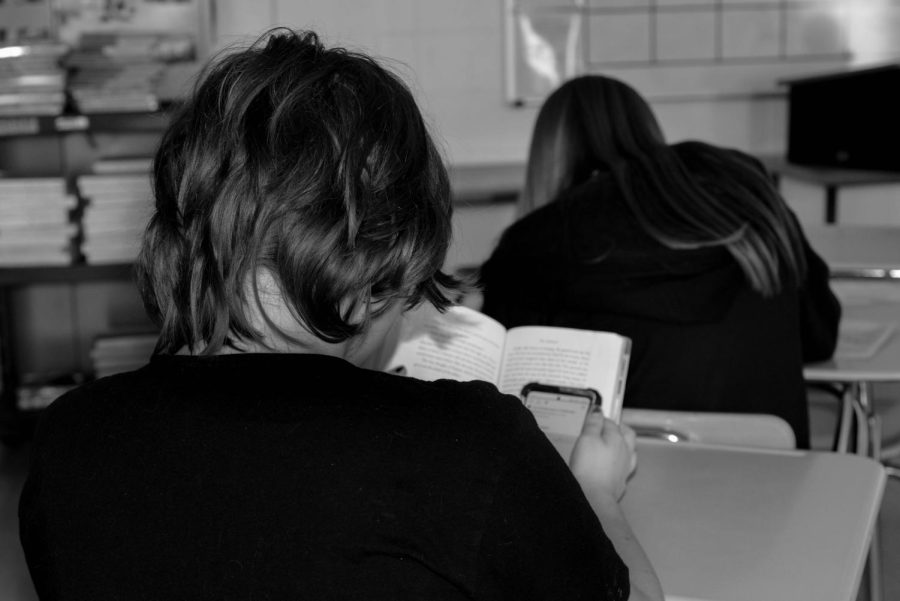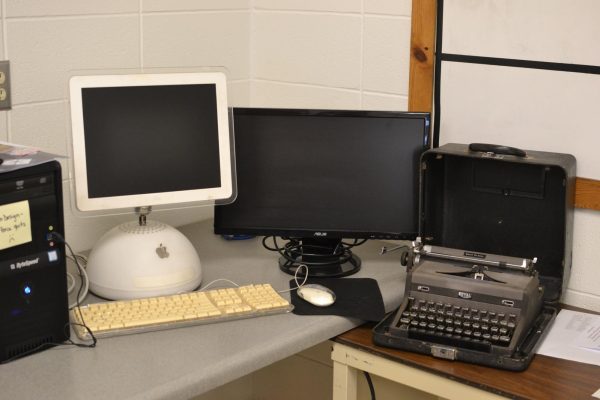Schoolwide phone restrictions would offer refreshing consistency
In the last few years, phones have become a problem at Rolla High School. Nearly every class has many students using their phone when they aren’t supposed to. It is frustrating for teachers to try to enforce phone rules, and it is hard for students to put their phones down.
The school’s current phone policy can be found in the RHS student handbook.
The handbook states, “A student is prohibited from using or having his/her personal cell phone turned on during class time or in classrooms, except at the specific request of the teacher for educational purposes. Cell phones may be used in the hallways during passing time and in the cafeteria during lunch. The intent of this policy is to allow the use of cell phones during non-instructional times and in non-instructional areas. Any unauthorized use of a cell phone in a classroom or during class time constitutes a violation of this policy.”
Students who violate the policy may have their phone confiscated for the rest of the school day and may be suspended for up to five days.
These rules have extreme consequences, and they aren’t enforced in most classrooms. It would be easier for both teachers and students if the phone policy, likely after being updated to be more specific, was properly enforced in every classroom in RHS.
Each teacher has taken to their own rules regarding phone use. Some classrooms have boxes that students must put their phones in every day. Other classes have several students hiding their phones behind their Chromebooks, or even using them in plain sight without consequence. These differing rules can make it challenging for students to keep up with, and they may make them more inclined to use their phones in classes that they normally wouldn’t use their phones.
“I think it’d be easier for the students if we all had the same rules because I think they forget. ‘This teacher lets me but this teacher doesn’t’,” said science teacher Karen Hammond.
It is also stressful and frustrating for teachers to enforce phone rules in their classrooms. It takes time away from class, and they are often telling the same students to put their phones away over and over again. French teacher Emily Mullen has experience with this.
“I have talked with my students and told them that I am no longer going to spend so much of our class time asking them to put away their phones or confiscating their phones, because there’s just not enough time in the day, and I have other, I think, more important things to do during our class time than worry about them choosing to be on their phones,” Mullen explained.
Most teachers support a schoolwide phone policy. In a poll of 30 teachers, 80% of respondents said that they wanted unified phone rules in the school. Some of the common comments that teachers mentioned were the need for consistency throughout the school and that phones were a distraction that were difficult to deal with. While many of these teachers have differing ideas about what they think the exact policy should be, most agree that nonacademic use of phones should be banned in the classroom.
Students have a different viewpoint on the situation. When asked if there should be a schoolwide phone policy limiting phone use, 56% said no, 29% said yes, and 16% said maybe. Students who said no had a variety of different reasons for saying no. Some of the common reasons were that phones are helpful for schoolwork, necessary for contacting parents (especially in an emergency), and that teachers should be able to decide themselves what they think the policy should be in their classroom. These are good points, but a school policy can be made to accommodate these things for the most part. If students need to contact their parents, most teachers will probably let them. If teachers should decide their classroom policy, it should probably be schoolwide because they have made it clear that they would like one. Most people in this school have lived the majority of their lives without using their phone for school-related things. We can do that again.
Students such as sophomore Azriel Graen also admit that phones are a problem in the school, even if they aren’t sure that a schoolwide phone policy would work. Graen sees that phones can be used as a learning tool but are just as commonly a coping mechanism.
“[Phones are] almost like an anti-stressor or an anxiety-reliever… but it doesn’t necessarily make them better for the environment… There’s a lot of distractions on it…So if you have another device to be able to research on and stuff, then I see [phones] as just a distraction,” Graen said.
Many students are under the impression that teenagers are old enough and mature enough to keep themselves from using their phones in class, but even universities, such as Missouri State, have strict rules about phone use.
According to Missouri State’s handbook, “Therefore, the Office of the Provost prohibits the use by students of cell phones, pagers, PDAs, or similar communication devices during scheduled classes. All such devices must be turned off or put in a silent (vibrate) mode and ordinarily should not be taken out during class.”
Some teachers and students are concerned about a schoolwide policy because they find phones useful in the classroom. This is a fair concern. Phones can be helpful for taking photos, checking grades, using calculators, tuning instruments, finding reference images, looking up unknown words, and many other things. However, the rule in the handbook already states that there can be exceptions to this rule, and many of these actions can also be done on Chromebooks, even if it isn’t as convenient. The rule exists so that students don’t use their phones when they shouldn’t.
Because phones are such a prevalent problem at RHS, they should be treated as such. The handbook exists to specify what behaviors and actions are prohibited at school and it provides the punishments for doing these things. Rules about technology misuse, skateboards, and laser pointers haven’t always existed. They were put in the handbook when they became a problem. It is clear that the current phone policy in the handbook isn’t working. Instead of leaving phone rules to be interpreted differently in every classroom, the policy should be updated and enforced so that phones are restricted in classrooms schoolwide.








